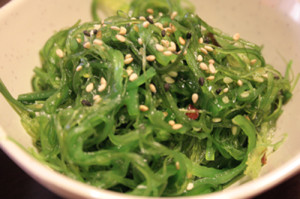In February 2012, an outbreak of gastroenteritis was reported in school A; a successive outbreak was reported at school B. A retrospective cohort study conducted in school A showed that seasoned green seaweed with radishes (relative risk 7·9, 95% confidence interval 1·1–56·2) was significantly associated with illness.
 Similarly, a case-control study of students at school B showed that cases were 5·1 (95% confidence interval 1·1–24·8) times more likely to have eaten seasoned green seaweed with pears. Multiple norovirus genotypes were detected in samples from students in schools A and B. Norovirus GII.6 isolated from schools A and B were phylogenetically indistinguishable. Green seaweed was supplied by company X, and norovirus GII.4 was isolated from samples of green seaweed.
Similarly, a case-control study of students at school B showed that cases were 5·1 (95% confidence interval 1·1–24·8) times more likely to have eaten seasoned green seaweed with pears. Multiple norovirus genotypes were detected in samples from students in schools A and B. Norovirus GII.6 isolated from schools A and B were phylogenetically indistinguishable. Green seaweed was supplied by company X, and norovirus GII.4 was isolated from samples of green seaweed.
Green seaweed was assumed to be linked to these outbreaks. To our knowledge, this is the first reported norovirus outbreak associated with green seaweed.
First norovirus outbreaks associated with consumption of green seaweed (Enteromorpha spp.) in South Korea
Epidemiology and Infection / Volume 143 / Issue 03 / February 2015, pp 515-521
J.H. Park, H.S. Jeong, J.S. Lee, S.W. Lee, Y.H. Choi, S. J. Choi, I.S. Joo, Y.R. Kim, Y.K. Park, and S.K Youn
http://journals.cambridge.org/action/displayAbstract?aid=9527975&fileId=S0950268814001332
